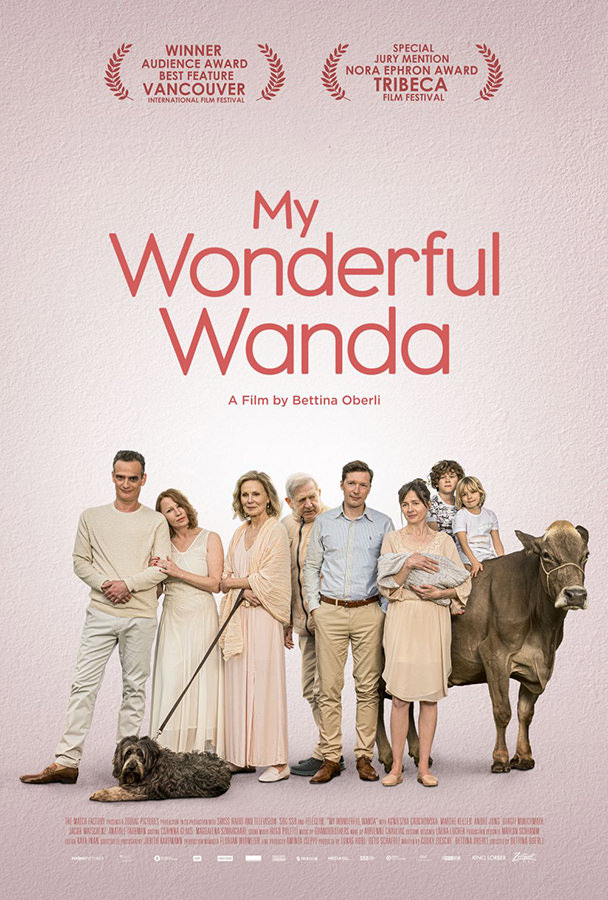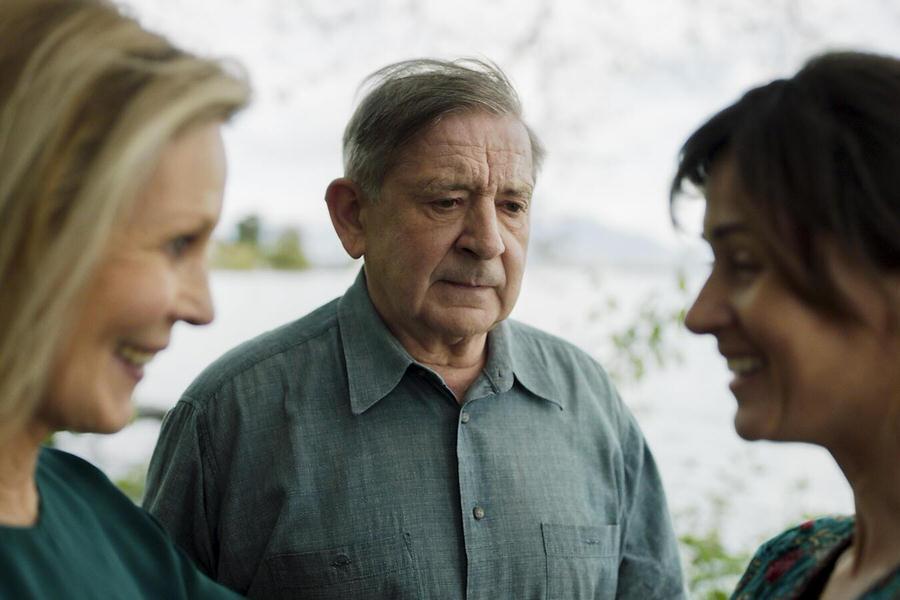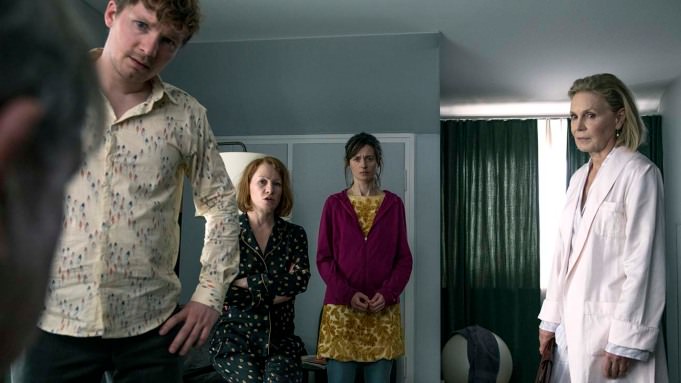My Wonderful Wanda
Directed by Bettina Oberli (2020) **
 Bettina Oberli and co-writer Cooky Ziesche’s Swiss-language drama/comedy My Wonderful Wanda is a wicked satire of wealth and nationalism, centering on a Polish single mother, Wanda (Agnieszka Grochowska), who leaves her two sons in the care of her father in order to take the long bus trip to Switzerland. There, at a splendorous estate alongside Lake Zurich, she has long been hired as a caregiver to the Wegmeister-Gloor’s aging and stroke-stricken Josef (André Jung). Wanda’s living quarters are relegated to a dingy basement room; upstairs live Josef’s wife Elsa (Marthe Keller, of 1976’s Marathon Man) and Josef’s ineffectual, bird-obsessed son, Gregor (Jacob Matschenz). Elsa makes a pretense of treating Wanda with respect, but takes advantage of her precarious financial situation, while Gregor nurses a crush on her. The bed-ridden Josef, meanwhile, also takes advantage of her need for money, paying her to sleep with him, unbeknownst to the distant Elsa.
Bettina Oberli and co-writer Cooky Ziesche’s Swiss-language drama/comedy My Wonderful Wanda is a wicked satire of wealth and nationalism, centering on a Polish single mother, Wanda (Agnieszka Grochowska), who leaves her two sons in the care of her father in order to take the long bus trip to Switzerland. There, at a splendorous estate alongside Lake Zurich, she has long been hired as a caregiver to the Wegmeister-Gloor’s aging and stroke-stricken Josef (André Jung). Wanda’s living quarters are relegated to a dingy basement room; upstairs live Josef’s wife Elsa (Marthe Keller, of 1976’s Marathon Man) and Josef’s ineffectual, bird-obsessed son, Gregor (Jacob Matschenz). Elsa makes a pretense of treating Wanda with respect, but takes advantage of her precarious financial situation, while Gregor nurses a crush on her. The bed-ridden Josef, meanwhile, also takes advantage of her need for money, paying her to sleep with him, unbeknownst to the distant Elsa.
Josef’s 70th birthday party, which he doesn’t take part in, becomes an occasion to hand the reins of his company to Gregor, who doesn’t want it, and introduces us to Gregor’s stiff and humorless sister, Sophie (Birgit Minichmayr, Downfall), who looks at Wanda with contempt, and Sophie’s pragmatic husband Manfred (Anatole Taubman, Quantum of Solace), an attorney. Wanda sneaks, when possible, to make video calls to her faraway sons.
Divided into three parts, each beginning with Wanda’s arrival on the bus, Part II soon has Josef miraculously walking for the first time in years and a further revelation which plunges the  family and caregiver into a contested dilemma resulting in various vies for power and influence: Josef is going to be a father. The situation soon brings into the picture Wanda’s lower-class parents (Cezary Pazura and Agata Rzeszewki) and — fairly unbelievably — a cow given to the family by the Wegmeister-Gloors. (What is it with European comedies so often needing animals prominently added to the movie posters?)
family and caregiver into a contested dilemma resulting in various vies for power and influence: Josef is going to be a father. The situation soon brings into the picture Wanda’s lower-class parents (Cezary Pazura and Agata Rzeszewki) and — fairly unbelievably — a cow given to the family by the Wegmeister-Gloors. (What is it with European comedies so often needing animals prominently added to the movie posters?)
The entire cast of actors have long resumes and convincingly inhabit their roles. Birgit Minichmayr is especially good at giving her Sophie, in what could have been a one-note character, a brittle frailty and sadness, while Marthe Keller’s Elsa hides melancholy secrets of her own which bear on the story’s outcome. Though largely shot on one location, My Wonderful Wanda has a varied look with the changing of the seasons, cinematographer Judith Kaufmann using vivid color schemes to portray differing moods.
 Though My Wonderful Wanda’s 112 minutes fly by, its tone of commentary and odd humor is too understated. Though consummately professional, and always engaging, the impression left after the film ends is that something is missing; the material needs a shot of emotion or observation stronger, more potent. It’s probably not fair to compare a drama/comedy to a genre film, but there are many parallels between My Wonderful Wanda and Rian Johnson’s release of the previous year, Knives Out. Both films take place in the mansions of aging patriarchs, who have various children and their spouses vying for power. Both center on a caregiver patronized and abused by the family. Both involve secret deals with the patriarch and the caregiver, usurping the will of the fighting family. Both films even end on the same note, their last several minutes remarkably similar. Where the Swiss film was conventional, though, Knives Out is bold, fast-paced, outrageously funny, witty and sharp. In short, it has oomph. While My Wonderful Wanda‘s ending is logical and bittersweet, Knives Out‘s coda is, as befits its title, more cutting.
Though My Wonderful Wanda’s 112 minutes fly by, its tone of commentary and odd humor is too understated. Though consummately professional, and always engaging, the impression left after the film ends is that something is missing; the material needs a shot of emotion or observation stronger, more potent. It’s probably not fair to compare a drama/comedy to a genre film, but there are many parallels between My Wonderful Wanda and Rian Johnson’s release of the previous year, Knives Out. Both films take place in the mansions of aging patriarchs, who have various children and their spouses vying for power. Both center on a caregiver patronized and abused by the family. Both involve secret deals with the patriarch and the caregiver, usurping the will of the fighting family. Both films even end on the same note, their last several minutes remarkably similar. Where the Swiss film was conventional, though, Knives Out is bold, fast-paced, outrageously funny, witty and sharp. In short, it has oomph. While My Wonderful Wanda‘s ending is logical and bittersweet, Knives Out‘s coda is, as befits its title, more cutting.
—Michael R. Neno, 2021 September 19